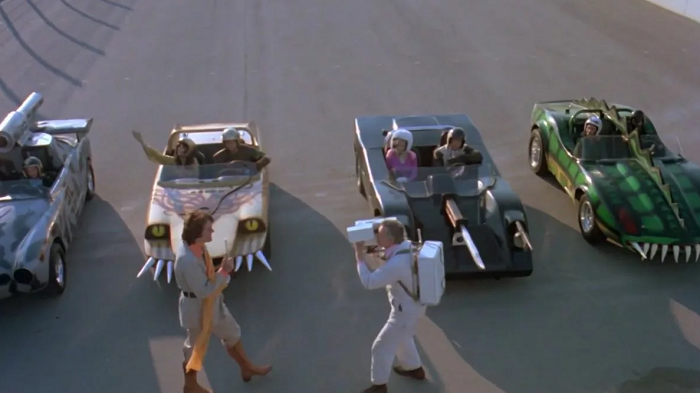
The recent passing of Roger Corman has sparked a new wave of interest in the career of the independent film icon and trailblazer. Known by such monikers as the “King of B-movies” and the “Pope of Pop Cinema”, Corman helped kickstart the careers of numerous young directors including Martin Scorsese, Francis Ford Coppola, Ron Howard, Peter Bogdanovich, James Cameron, and Jonathan Demme. He also helped launch such stars as Jack Nicholson, Peter Fonda, Dennis Hopper, and Diane Ladd among many others.
Corman began his career in 1955 directing and producing over fifty movies. In the 1970s he moved to almost exclusively producing. In May 1970, he and his brother Gene co-founded their own independent production and distribution studio, New World Pictures. They were perhaps known best for their many exploitation films that put countless directors and actors on the map. But New World Pictures also distributed an array of foreign films from such celebrated filmmakers such as Fellini, Bergman, and Truffaut.

“Death Race 2000” fits snugly into Corman’s exploitation era of producing. Directed by Paul Bartel, this satirical action film was based on a 1956 Ib Melchior short story titled “The Racer”. The movie has all the markings of 1970s grindhouse cinema – a low budget, an anything-goes style, bursts of gratuitous violence, and at times shamelessly sleazy.
The movie is set in the year 2000 (posing as the near future) and takes place in a dystopian America. After what’s referred to as the “World Crash of ’79”, a totalitarian regime took power in the remains of the economically ravaged United States. To offer some solace to the suffering people, the government under ‘Mr. President’ (Sandy McCallum) instituted an annual Transcontinental Road Race – a grueling and violent trek from New York to Los Angeles.

Broadcasted live, the race is known for its flamboyance and brutality. It features five racers, each with their own over-the-top personas and souped-up custom-themed cars. In addition to finishing first, the drivers can also earn bonus points for hitting pedestrians they encounter along the way. Women are worth more points than men, children even more, and the elderly earns the most. It’s a sadistic twist that speaks to the movie’s glaringly obvious satirical edge.
There’s an undeniable wackiness to the entire premise that begins with the racers themselves. There’s the two-time champion and proverbial fan favorite Frankenstein (David Carradine hilariously decked out in a black leather bodysuit, cape, and mask). There’s also the blustering Chicago mobster, Joe “Machine Gun” Viterbo (Sylvester Stallone in one of his earliest credited roles), the tough-as-nails cowgirl, “Calamity Jane” Kelly (Mary Woronov), the proudly racist Neo-Nazi, Matilda “The Hun” (Roberta Collins), and a wannabe Roman gladiator, Ray “Nero the Hero” Lonagan (Martin Kove).
As the drivers and their ride-along navigators tear out across the continental United States, the race is covered by play-by-play announcer Junior Bruce (played with an unhinged enthusiasm by famed Los Angeles disc jockey Don Steele). But while most of the country is locked onto the race, Thomasina Paine (Harriet Medin), descendant of founding father Thomas Paine and the leader of the American resistance, has cooked up a plan to sabotage the event, taking special aim at the beloved Frankenstein.

Vehicular violence and mayhem ensues as the racers fight against each other and against Paine’s loyalists who set up an assortment of traps all along their routes. Weird groupies, priestly political figures, and self-promoting media types give shape to the world and offer screenwriters Robert Thorn and Charles B. Griffith plenty of opportunities for sociological satire. Director Paul Bartel squeezes all he can out of the film’s modest budget, putting together some thrilling race sequences and visualizing a dystopian future that admittedly looks cheap at times but also shows insightful imagination.
And then you have the Roger Corman influence. Corman wanted a violent futuristic sports film in the similar vein as “Rollerball”. He made sure his was particularly brutal, adding plenty of pasty fake blood and crushed bodies. Bartel would later talk about how Corman removed the bulk of the comedy which was a key part of the director’s vision. But there are still hilarious lines delivered with a deadpan seriousness that make them even funnier. It all coalesces into something delightfully campy and just as twisted – a wildly entertaining B-movie that fits snugly into Roger Corman’s eclectic filmography.
VERDICT – 3.5 STARS


I have always enjoyed this film. I covered it on my series last year of Throwback Thursday 1975 films. This is exploitation from the grindhouse era that is relatively tame but also very entertaining.
https://kirkhamclass.blogspot.com/2023/06/kamad-throwback-thursdays-1975-death.html
Nice! Thanks for sharing. It was fun rewatching. I was surprised by how little I remembered about it.
I’ve only seen bits of this film but I like what I saw as I miss movies that aren’t afraid of being exploitation and such as they don’t take themselves seriously. They’re so fun to watch.
They really are fun to watch and their self-awareness was often a real strength
Thanks for the retro review. A heads up that Thomas Paine had no living children. More likely,Thomasina Paine was a descendant of Thomas Treat Paine, who signed the Declaration of Independence, but that man was no relation to the author of Common Sense.
For more info, see ThomasPaine.org
Good stuff. I wasn’t sure if they were going that route or just making up their own rules. 😀
Moe Howard’s been gone for 49 years